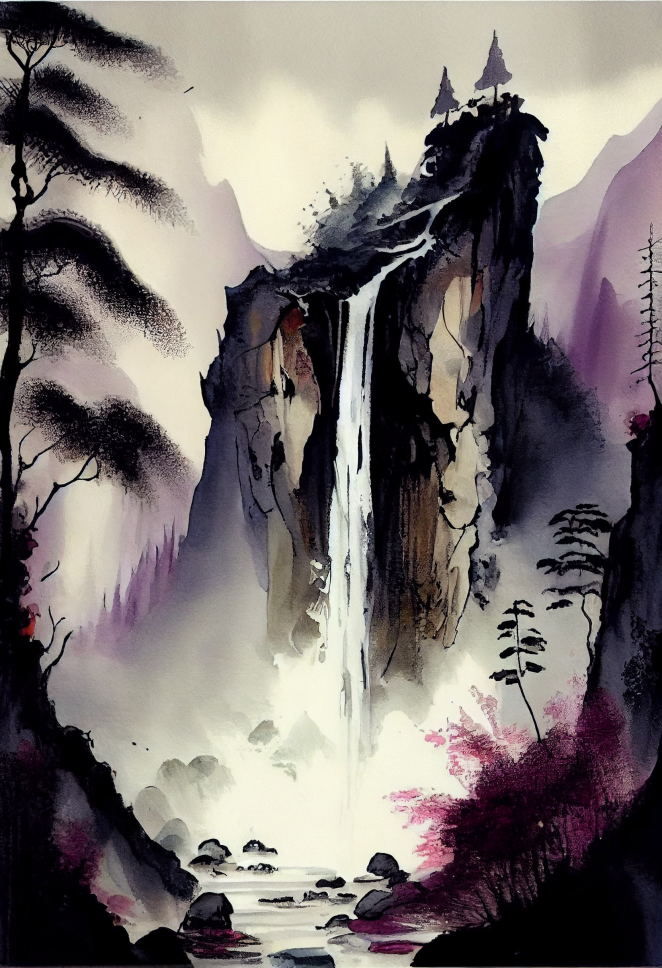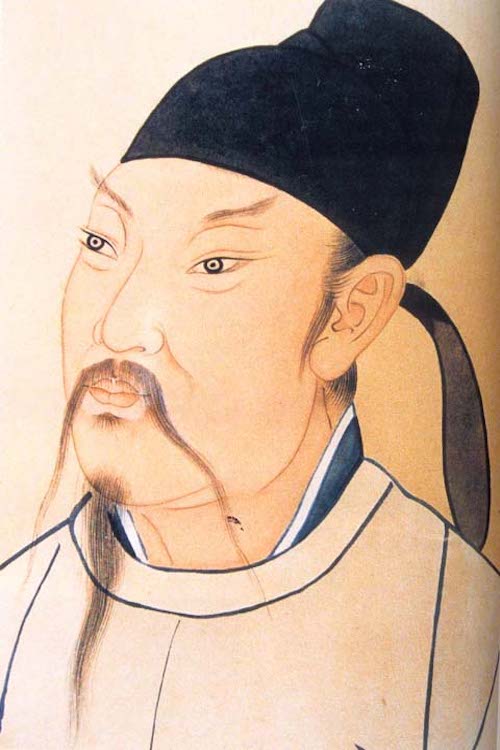
Beneath the sun’s illuminating rays,
The incense peak gives birth to purple haze.
A waterfall, a white silk veil,
Hangs before the mountain’s pale.
From high cliffs, the water plummets down,
A mesmerizing sight, an awe-inspiring frown.
A cascade of silver, a galaxy’s descent,
A dreamlike state, a moment’s content.
This is a landscape poem written by the poet Li Bai when he lived in seclusion in Mount Lushan around the age of fifty. This poem vividly depicts the majestic and magnificent scenery of Lushan Waterfall, reflecting the poet’s infinite love for the great rivers and mountains of the motherland. The first sentence “Rizhao censer produces purple smoke”. “Censer” refers to the incense burner peak of Lushan Mountain. This peak is in the northwest of Lushan Mountain, with a sharp and round shape, like an incense burner. Due to the cascading waterfalls and the steaming water, under the sunshine, it seems that there are clouds of purple smoke slowly rising from the incense burner that stands on top of the sky. The word “sheng” vividly depicts the scene of rising smoke and clouds. This sentence sets up a majestic background for the waterfall, and also renders the atmosphere for the direct description of the waterfall below.
The second sentence is “Looking at the waterfall hanging in front of the river”. The four characters “Looking at the Waterfall from afar” echo the title “Looking at the Waterfall on Lushan Mountain”. “Hangqianchuan” means that the waterfall hangs from the cliff to the river in front like a huge Bailian. The character “hanging” turns movement into stillness, and Weisha Weixiao writes about the waterfall in the distance.
The first two sentences of the poem start from the big picture and outline the panoramic view: the top of the mountain is shrouded in purple smoke, the white trains are hanging in the mountains, and the torrents are rushing down the mountain, forming a gorgeous and magnificent picture.
The third sentence “flying down three thousand feet” is a detailed description of the waterfall from close up. “Feiliu” means that the waterfall shoots out of the sky, gushing and flying down. “Straight down” not only describes the steepness of the rock wall, but also the urgency of the water flow. “Three thousand feet” is an exaggeration, describing the height of the mountain.
Writing in this way, the poet felt that the majestic momentum of the waterfall had not been fully expressed, so he then wrote a sentence “it is suspected that the Milky Way falls nine days”. It is said that this “flying down” waterfall makes people suspect that the Milky Way poured down from the nine heavens. A “doubt” is used in an ethereal and lively way, if it is real and unreal, it attracts people’s imagination and adds to the magical color of the waterfall.
This poem uses metaphors, exaggeration and imagination extremely successfully. Su Dongpo admired this poem very much, saying that “the emperor sent the Milky Way down the line, and in ancient times there are only the words of banishing immortals”. The “banished immortal” is Li Bai. “Looking at Lushan Waterfall” is indeed an example of describing scenery and expressing emotions.
日照香爐生紫煙,遙看瀑布掛前川。
飛流直下三千尺,疑是銀河落九天。

Li Bai (701-762), considered one of China’s greatest poets alongside Du Fu, lived during the Tang Dynasty’s golden age of poetry. Known for his vivid imagery and deep emotion, Li Bai’s work spans about 1,000 poems on themes like nature, friendship, and existential reflections. Celebrated for his spontaneous verse and exploration of Taoist ideals, Li Bai’s poetry also deeply admires the natural world and ancient times, often challenging life’s ordinary constraints. His depiction of China’s landscapes combines natural beauty with personal sentiment. Earning the title ‘Poetry Immortal,’ Li Bai’s influential poetry is globally admired for its artistic and philosophical depth.
Image: MidJourney/DALL-E 2